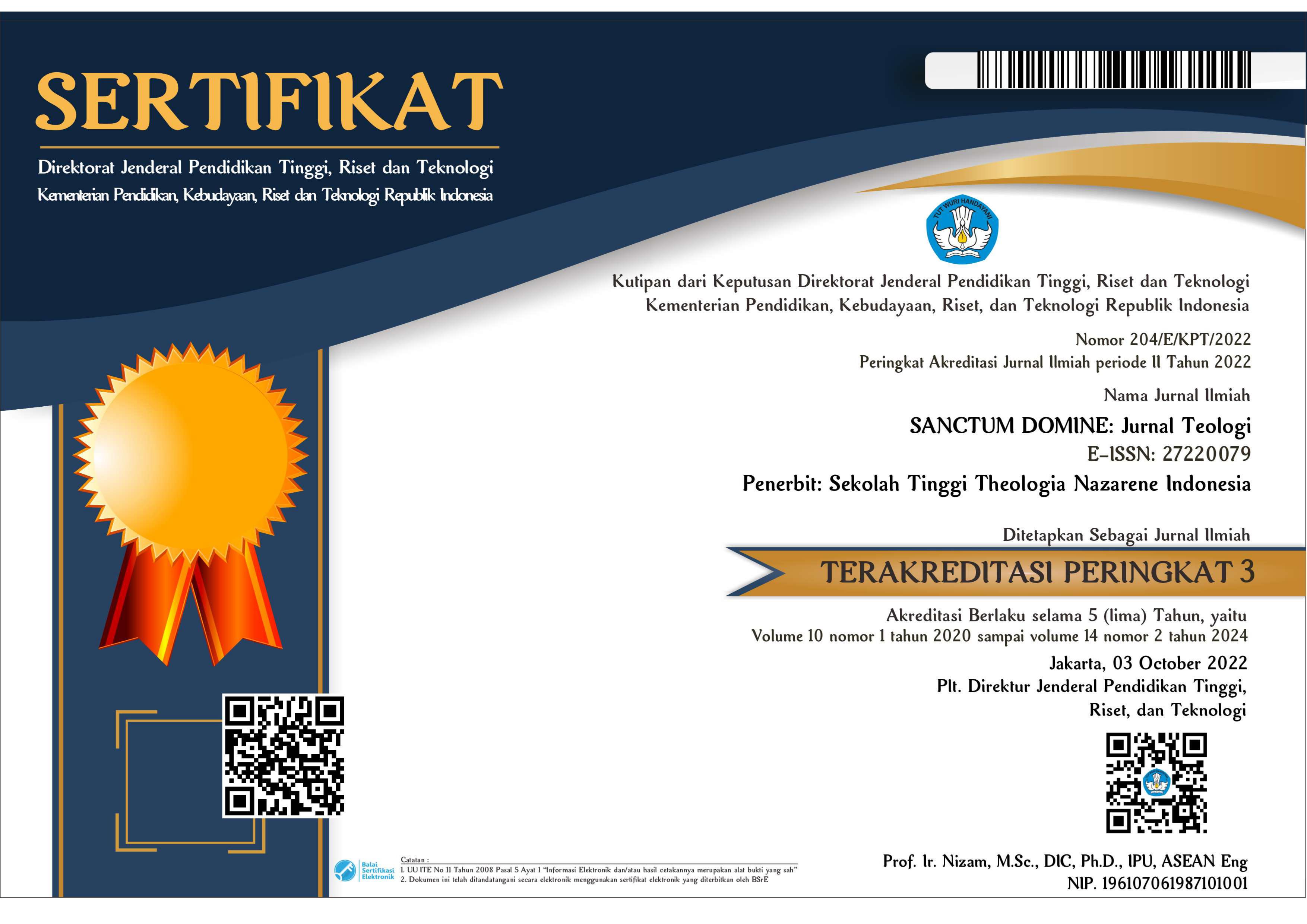God Acts Behind the Scenes in Believers' Suffering
Theodicy in the Exodus Narrative 1-2
Abstract
Suffering is a topic that is often discussed. The suffering that often afflicts humans raises human arguments about the absence of God. They think that if God exists, suffering should not exist. Looking at Exodus 1-2, the narrative does not mention God's name in the suffering the Israelites faced. Through this article, the author will explore how God's role works behind the scenes in people's suffering. The author uses a qualitative method with a narrative interpretation approach to assessing the text. The research question in this study is how is the role of God behind the scenes in the suffering of believers according to theodicy in the narrative of Exodus 1-2? This study aims to find the part of God behind the scenes in the suffering of believers by examining theodicy in the description of Exodus 1-2. This study found that God works behind the scenes for the people through His providence in suffering. Chapter 1 describes God's providence to Israel, and Chapter 2 God's providence to the deliverer. This providence is proof of God's faithfulness to His covenant and shows that His plan must be fulfilled, and nothing can thwart God's plan for His people. It can be concluded that the analysis of the narrative structure of Exodus 1-12 confirms that God works behind the scenes of the people's suffering by organizing the flow of the people's life scenarios in the suffering they face.
References
Andiñach, Pablo R. “Prologue to Liberation: On Exodus 1:1-7.” Word & World 33, no. 2 (2013): 140–146. https://ezproxy.usj.edu.mo:9443/login?url=http://search.ebscohost.com/login.aspx?direct=true&db=rfh&AN=ATLA0001938135&site=eds-live%0Ahttp://www.luthersem.edu/ (Publisher’s URL:).
Baden, Joel S. “From Joseph to Moses: The Narratives of Exodus 1-2.” Vetus Testamentum 62, no. 2 (2012): 133–158.
Baskoro, Paulus Kunto, and Joseph Christ Santo. “Kajian Biblika Makna Ibadah Yang Murni Dalam Yakobus 1:26-27 Dan Implikasinya Bagi Orang Percaya Masa Kini.” Predica Verbum: Jurnal Teologi dan Misi 1, no. 2 (2021): 93–105.
Berlyn, Patricia J. “The Pharaohs Who Knew Moses.” Jewish Bible Quarterly 39, no. 1 (2011): 3–14. http://search.ebscohost.com/login.aspx?direct=true&db=rfh&AN=ATLA0001818235&site=ehost-live.
Gross, Mark. “Significant Anonymity in Exodus 2.” Jewish Bible Quarterly 38, no. 2 (2010): 115. http://search.ebscohost.com/login.aspx?direct=true&db=a9h&AN=50318087&site=ehost-live.
Hamilton, Victor P. Exodus: An Exegetical Commentary. Vol. 5. Michigan: Baker Academic, 2011.
Hidayat, Elvin Atmaja. “Iman Di Tengah Penderitaan: Suatu Inspirasi Teologis-Biblis Kristiani.” Melintas 32, no. 3 (2017): 285.
Holladay, William L. A Concise Hebrew and Aramaic Lexicon of the Old Testament. Leiden: Koninklijke Brill NV, 2000.
Illu, Jonidius. “PENDERITAAN DALAM PERSFEKTIF ALKITAB Dr. Jonidius Illu 1 , Sekolah Tinggi Teologi Arastamar Jakarta.” Luxnos 5, no. 2 (2019): 24–28.
Langston, Scott M. Exodus Through the Centuries. Oxford: Blackwell Publishing, 2006.
Ngesthi, Yonathan Salmon Efrayim, Matius I Totok Dwikoryanto, and Fatiaro Zega. “Kontroversi Bohong Dalam Keluaran 1:8-22.” Jurnal Teologi Berita Hidup 4, no. 1 (September 21, 2021): 221–234. https://e-journal.sttberitahidup.ac.id/index.php/jbh/article/view/146.
Ngwa, Kenneth N. “The Making of Gershom’s Story: A Cameroonian Postwar Hermeneutics Reading of Exodus 2.” Journal of Biblical Literature 134, no. 4 (2015): 855–876.
Osborne, Grant. Spiral Hermeneutika. Surabaya: Momentum, n.d.
Pandor, Pius. Ex Latina Claritas. Jakarta: Obor, 2010.
Panjaitan, Firman, and Hendro Hariyanto Siburian. “Allah Yang Kreatif Dan Dinamis Dalam Ayub 42:7-17: Sebuah Perlawanan Terhadap Teologi Retribusi.” Kurios 6, no. 2 (2020): 240.
Piper, John. Corona Virus and Christ. Surabaya: Perkantas, 2020.
Plager, Dennis. Exodus: God, Slavery and Freedom. Washington: Regnery Faith, 2018. https://www.ptonline.com/articles/how-to-get-better-mfi-results.
Pratt, Richard. He Gave Us Stories. Surabaya: Momentum, 2005.
Rantesalu, Marsi Bombongan. “Penderitaan Dari Sudut Pandang Teologi Injili.” Jurnal Ilmiah Religiosity Entity Humanity (JIREH) 2, no. 2 (2020): 126–135.
Reed, Carl Alvin. Diktat Teologi Pentateukh. Yogyakarta: STTII Yogyakarta, 2018.
Ryken, Philip Graham. Exodus: Saved for God’s Glory. Wheaton: Crossway Books, 2005.
Saputro, Anon Dwi. “Analisa Majas Ironi Dalam Narasi Panggilan Yunus 1:1-17 Sebagai Konstruksi Teologi Yunus 1” 1, no. 2 (2021): 48–64.
SIN, SIA KOK. “Musa Dan Kepemimpinannya Dalam Kitab Keluaran.” SOLA GRATIA: Jurnal Teologi Biblika dan Praktika 1, no. 1 (2020).
Stefanus Agus Budi Yanto, Paulus Kunto Baskoro. “Kajian Teologis Konsep Hidup Tekun Menurut Surat Yakobus 1:2-8 Dan Aplikasinya Bagi Kehidupan Orang Percaya Pada Masa Kini.” RITORNERA; Jurnal Teologi Pantekosta Indonesia 1 No 2 (2021): 37–60.
Tripp, Paul David. Suffering (Penderitaan). Surabaya: Perkantas, 2020.
Zaluchu, Sonny. “Penderitaan Kristus Sebagai Wujud Solidaritas Allah Kepada Manusia.” DUNAMIS: Jurnal Penelitian Teologi dan Pendidikan Kristiani 2, no. 1 (2017): 61.
Zuck, Roy B. Hermeneutik Basic Bible Interpretation. Malang: Gandum Mas, 2014.
Copyright (c) 2023 SANCTUM DOMINE: JURNAL TEOLOGI

This work is licensed under a Creative Commons Attribution-NonCommercial-ShareAlike 4.0 International License.
Copyright:
SANCTUM DOMINE: Jurnal Teologi will validate, produce, disseminate, and act as steward in the long-term curation of every article published. In order to achieve this, the author typically requires a transfer or “assignment” of the copyright in the article. As is the case for open access publishing, the author (or copyright owner of the article, if different) signs an author publishing agreement. The agreement incorporates the necessary transfer of copyright.
After assigning copyright, the author will still retain the right to:
- Be credited as the author of the article.
- Own and exercise any trademark or patent rights held by author and addressed in the article.
- Make printed copies of the article to use for a lecture or class that the author leading on a non-commercial basis.
- Share the article with friends, colleagues and influential people the author would like to read the work.
- Present the article at a meeting or conference and distribute printed copies of the article on a non-commercial basis.
License:
This work is licensed under a Creative Commons Attribution-NonCommercial-ShareAlike 4.0 International License.
You are free to:
- Share — copy and redistribute the material in any medium or format
- Adapt — remix, transform, and build upon the material
- The licensor cannot revoke these freedoms as long as you follow the license terms.
Under the following terms:
- Attribution — You must give appropriate credit , provide a link to the license, and indicate if changes were made . You may do so in any reasonable manner, but not in any way that suggests the licensor endorses you or your use.
- NonCommercial — You may not use the material for commercial purposes .
- ShareAlike — If you remix, transform, or build upon the material, you must distribute your contributions under the same license as the original.
- No additional restrictions — You may not apply legal terms or technological measures that legally restrict others from doing anything the license permits.
Notices:
You do not have to comply with the license for elements of the material in the public domain or where your use is permitted by an applicable exception or limitation .
No warranties are given. The license may not give you all of the permissions necessary for your intended use. For example, other rights such as publicity, privacy, or moral rights may limit how you use the material.



8.png)









